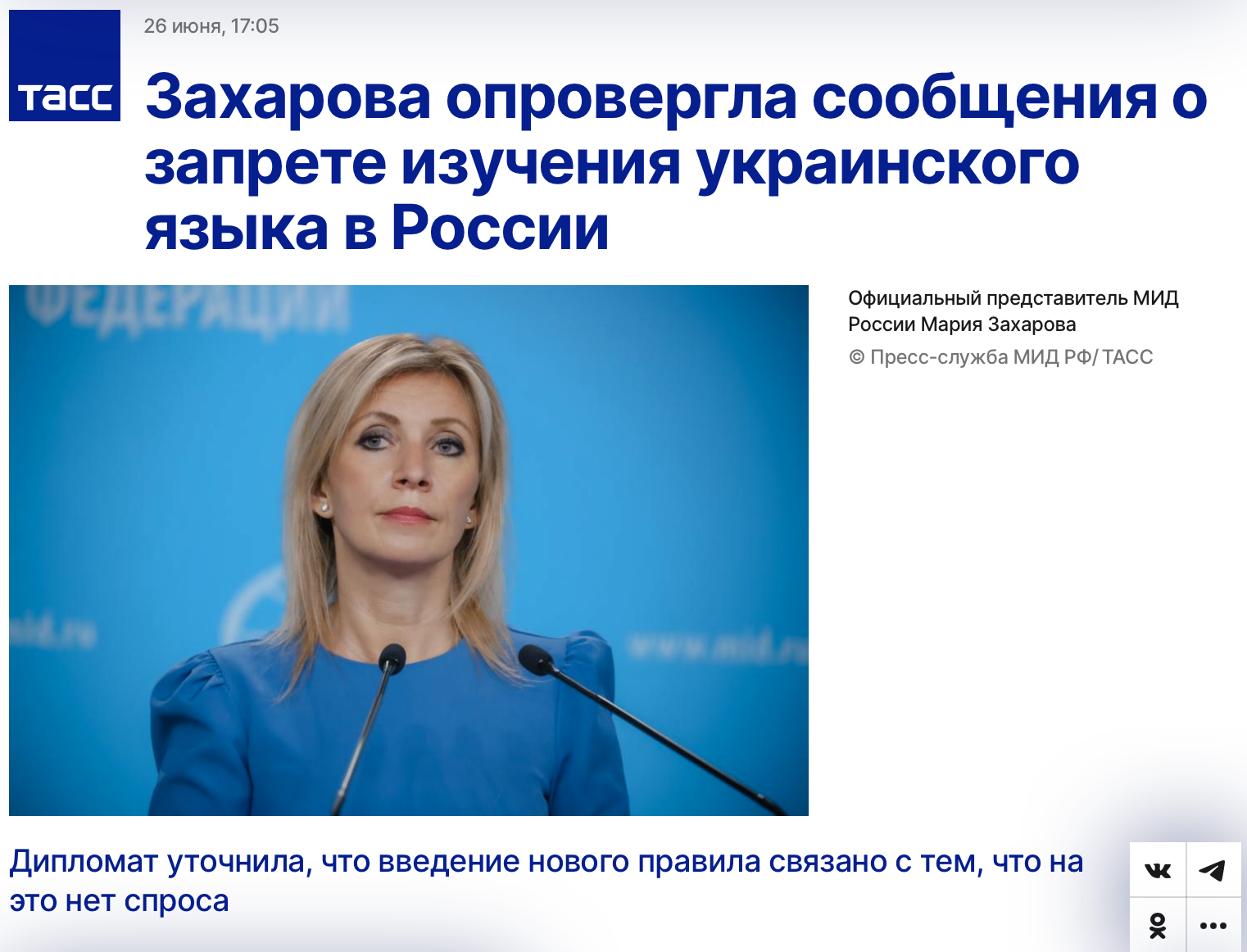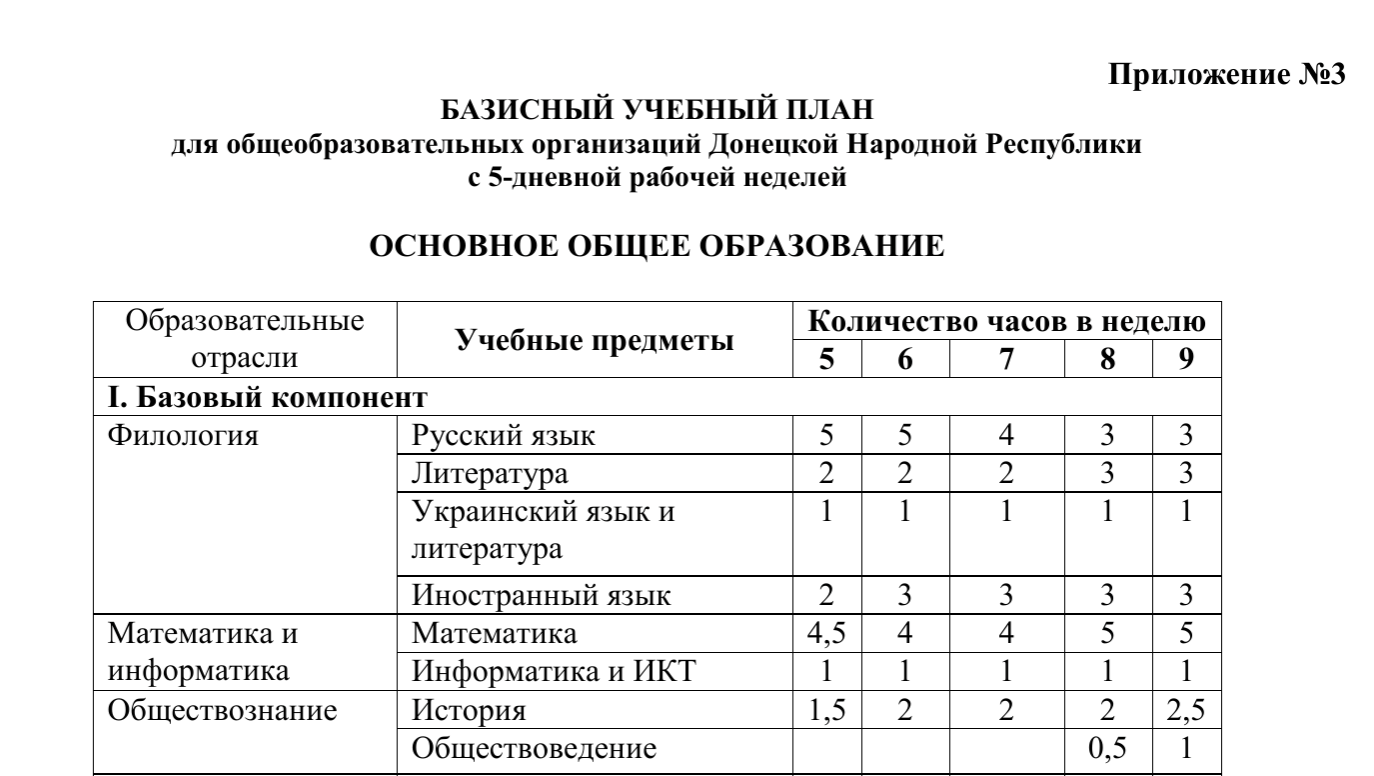Verification within Meta’s Third-Party Fact-Checking Program
A statement by Russian MFA spokeswoman Maria Zakharova is being spread online about the alleged lack of demand for the Ukrainian language in the temporarily occupied territories. This is how she explained the Russian authorities’ decision to completely abandon its teaching.
This is manipulation. The ban on the Ukrainian language is a typical practice of Russia’s occupation policy. According to a 2022 survey by the Rating sociological group, the majority of residents of the southern regions consider Ukrainian their native language.
Screenshot of the article
On June 23, a draft decree of the Russian Ministry of Education was published on the Russian federal portal of legal acts. The decree bans the study of Ukrainian in schools in Ukraine’s temporarily occupied territories.
The claim that in the occupied territories of Donetsk, Luhansk, Zaporizhzhia, and Kherson regions, the Ukrainian language is “not in demand” is not supported by any evidence. Instead, the results of the 2001 All-Ukrainian Census show the opposite:
- in the Kherson region, 73.2% of the population named Ukrainian as their native language (Russian — 24.9%),
- in the Zaporizhzhia region — 50.2% (Russian — 48.2%),
- in the Donetsk region — 24.7% (Russian — 74.9%),
- in the Luhansk region — 30% (Russian — 68.8%).
Also, according to a nationwide survey by the Rating sociological group, conducted in all territories except the occupied parts of Donbas and Crimea, in March 2022, 61% of residents of the southern (Odesa, Mykolaiv, Dnipropetrovsk, Kherson, and Zaporizhzhia) and 42% of the eastern (Kharkiv, Donetsk, Luhansk) regions of Ukraine named Ukrainian as their native language. Russian — 32% and 49% respectively. It is very unlikely that in two decades, and especially in the past few years, the Ukrainian language has completely disappeared from all four regions.
Even according to Russian surveys in the temporarily occupied regions of Ukraine in 2023, there is noticeable demand for the Ukrainian language: 64% of parents in the Kherson region and 46% in Zaporizhzhia expressed a desire for their children to study it. Although we cannot verify the reliability of these figures, they still indicate preserved interest in the language.
The policy of deliberately displacing Ukrainian from the public sphere is a typical practice of the Russian occupation authorities. A telling example is the sharp reduction of Ukrainian-language education in the territory of Donbas, which has been occupied since 2014. Already in the 2015–2016 academic year, 98% of schoolchildren in the occupied part of the Donetsk region studied entirely in Russian. For comparison: in the 2013–2014 academic year, 50.4% of students in the region studied in Ukrainian.
Before the occupation, for example, 5th-grade students had 3.5 hours of Ukrainian language and 2 hours of Ukrainian literature per week. Already in the 2016–2017 academic year — only 0.5 hours for each subject. Instead, the Russian language had 5 hours, and Russian literature another 3 hours per week. And in the 2022–2023 academic year, two more separate subjects were added to the curriculum — “Native language (Russian)” and “Native literature (Russian)” — despite the already existing lessons of Russian language and literature.
Distribution of class hours by subject in the self-proclaimed “DPR” in the 2016–2017 academic year
The occupation authorities did not take the language situation into account and, from the very first years, introduced a sharp transition to Russian. And in 2020, in the self-proclaimed “DPR” the status of Ukrainian as a state language was completely cancelled, and the teaching of Ukrainian language and literature in local schools was banned.
At the international level, Russia’s linguistic crimes are also recognized and condemned. In particular, the 2024 report of the UN Independent International Commission of Inquiry on Ukraine recorded the linguocide of the Ukrainian language in the temporarily occupied territories. In its report, the human rights organization Human Rights Watch notes that the Russian authorities are deliberately eradicating the Ukrainian language. The facts of linguocide are also confirmed by decisions of the International Court of Justice and the European Court of Human Rights.
Attention
The authors do not work for, consult to, own shares in or receive funding from any company or organization that would benefit from this article, and have no relevant affiliations



